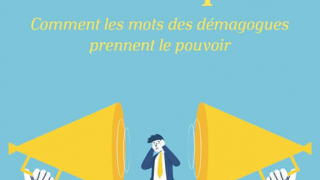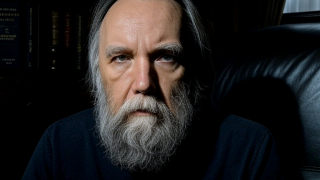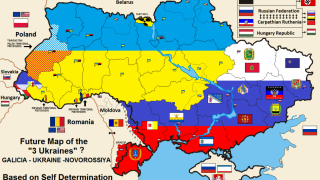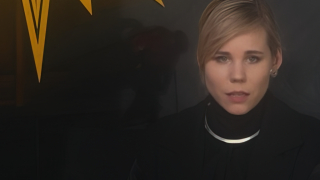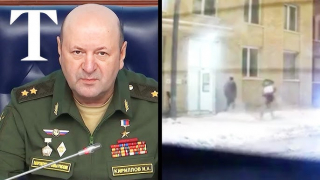Christian Materialism and the Unity of Russian History
Session 7 “Historiosophy of the Russian Way”
My report aims to combine three stages of Russian history: the Russian Empire, the Soviet Union, and modern Russia. There has been a lot of discussion about this over the last 9 months, and, in fact, over the last 20 years. Lances have been broken but no consensus has been reached. The Reds (the Communists were commonly called the Reds during the Soviet period) continue to hate everything that has to do with religion and the state. The Whites (those who supported the Tsar and Imperial Russia after the Revolution of 1917) continue to hate everything related to the Soviet Union and the people who lived there.
I have come to realize that this gap is also present on the level of Russian philosophy. Open any textbook that claims to build a single history, not just a list of doctrines. Take "The History of Russian Metaphysics" by Igor Evlampiev or "How Religion is Possible" by Konstantin Antonov. You won't find the Soviet period there. And if in Antonov's work it is quite clear why (although religion existed in the Soviet period, and our philosophers wrote about the religious essence of Marxism), Evlampiev omits it too, as any other more or less coherent work on the subject. The Soviet period is simply ignored. Of course, one can read about this period in other textbooks. However, there will be no unity and historiosophical connection between the Soviet period and the Russian Empire and the Russian religious philosophy and dialectical materialism.
In my opinion, the task of bridging this gap is obvious, especially in view of the very strong institutional development of the Soviet philosophy of dialectical materialism. We can argue forever about the fallacies and errors of materialism, but this is an institutionally developed discipline and a huge resource that we are losing.
What made me think about this? Listening to the presentation of Andrei Korobov-Latyntsev's book "The Philosopher and the War," I discovered an interesting idea that allows me to bypass all the acute points regarding the connection between the Russian Empire and the Soviet Union. This idea helps to find a perspective from which it would be possible to philosophically unite all thinkers, both pre-revolutionary and post-revolutionary, in their attitude to the war and the patriotic position they have always held. I thought it was an interesting approach, and in this way it was possible to combine the history of Russian philosophy and Russian history. In my opinion, the first step in this direction could be the unification of the history of Russian philosophy. As Vladimir Varava noted, Russian philosophy is historiosophy. So if we find the lines of contact between Russian pre-revolutionary and Soviet philosophy, find the basis for their unification, then perhaps we will restore Russian history in its unity.
I've also come to believe that we have unfairly stigmatized the concept of matter and the material. Of course, liberalism often goes hand in hand with materialism, and we had "enough" of matter during the Soviet period. But if we are talking about the rectification of names, we need to treat the concept of matter more responsibly and not disgrace with it everything that is connected not with matter, but rather with consumption as some sinful distortion of the will to use matter. This idea that all things, including material things, have no evil inclination is common to the works of the Holy Fathers. The hieromartyr Methodius of Olympus said that the one who commits evil is not evil in his nature, but is evil because of the very act of committing evil. Nothing is evil by its nature, but evil, including things, becomes evil by how it's used. There is no evil impulse in matter - we bring it there because we've deformed our will. When we set our heart on the desire to get rid of responsibility, we throw everything onto matter. We say that it is matter that attracts and attracts us, and we give up our freedom in favor of matter. However, the basic definition of matter is that it is "that which has no personal will, can only suffer, but cannot exert any influence of its own". Therefore, in my opinion, our criticism of materialism is a criticism of our rational understanding of matter. This is pointed out, for example, by Father Sergius Bulgakov (the Russian philosopher and priest of the beginning of the 20th century), who says that our modern concept of matter is a product of rationalism. It is my opinion that the concept of matter is in need of revision in this regard.
Not very popular, but sometimes found in studies of Russian philosophy, is the concept of religious materialism. Father Sergius Bulgakov used this concept in relation to Vladimir S. Solovyov for example (the Russian religious philosopher, poet, professor of the end of the 19th century). This concept aims at the realization of the Schellingian line of understanding nature, where nature doesn't come in its rational understanding or as an empty idealistic copy, but as an opposite subject that can tell us something, and our self-consciousness requires an encounter with it.
Friedrich Schelling argued that just as consciousness must come to know nature, nature must come to be consciousness. Discussing this project of Schelling and adding reasons on the works of Vladimir Solovyov, Father Sergius writes in his article "The essence of Vladimir Solovyov's philosophy": "Idealism, as it exists in the dominant philosophical schools of Kantianism, Fichteanism and Neo-Kantianism, saves the spiritual personality from materialism. But the price of this is that it bleeds the world and man white. The latter becomes a homunculus. He is locked up in a retort, and is firmly separated from other people and from this world". In my view, the modern transhumanist understanding of the human as a project, as a product of random assembly, as chance - is not a consequence of materialism, but a rejection of materialism. This is a consequence of idealism in its bad sense as a denial of all that is definite, living and vital. In this sense, idealism, as a retreat into the world of ideas that exists in our consciousness, leads to the fact that we can and must transcend the material. We must abandon everything material that makes us what we are. We need to escape to the Being that we observe in our objective consciousness, which is the guiding force of the World of Ideas. Transhumanism as an idea of contempt for anything material, or the randomness of material, is a consequence of poorly understood idealism, which is common in the work of even the most serious idealists.
This kind of idealism turns a person into a homunculus, locked in a retort and tightly separated from other people, from the world. This homunculus, as Schelling aptly and maliciously put it writing to Fichte about this idealistic world, belongs to the "pocket-format world".
Is it possible to have a worldview on the basis of which one can be a materialist and at the same time feel one's unity with nature, humanity, and the earth? It is precisely this that modern man, homo economicus, lacks. They don't feel any real oneness with the earth, nor do they feel any particular point of attraction that could give them some tangible outlines of being. Bad idealism obliterates all this. At the same time, it affirms the identity of man with his desires, postulates about a supernatural divine being that illuminates and comprehends natural life. For many people of our time, this is a question hidden deep in their souls. Vladimir Solovyov's doctrine of nature meets exactly this need of the modern spirit. The author himself gave his theory the characteristic name of religious materialism, which, in a strictly philosophical sense, can be defined as a specific natural philosophical ritualism or panpsychism.
What does this religious materialism imply? Along with materialism, it is the recognition of the substantiality of matter, of the metaphysical reality of nature. It sees man not as a spirit enclosed in a case of matter, but as a spiritual-corporeal natural being whose metaphysical destiny is inextricably bound up with the natural world. At the same time, in contrast to materialism, the author sees in matter not only a dead action of atoms or forces with the epiphenomenon of life. He defends the primacy and universality of life, which flourishes in the works of nature. For the author, the difference between living and inanimate is quantitative, not qualitative.
With the help of the Church, nature in man becomes capable of deification, and this receives a clear testimony in the Sacrament of the Body and Blood. This religious materialism pervades all Christian dogma. It is formulated in the works of the Holy Fathers and Teachers of the Church - for example, St. Athanasius of Alexandria. It also gets dogmatized in the Ecumenical Councils and gets defined in the ecclesiastical practice. The destiny of Nature, groaning and waiting to be liberated, now becomes linked to that of Human, who left it. The New Heaven and Earth become a necessary element in the composition of Christian eschatology. It points to the foundation of materialism, so understood, in the Christian heritage.
Moreover, the whole revolutionary essence of Christianity lies in the fact that Christ, the Logos, who by definition exists immaterially outside of space, became incarnate. The Logos was made flesh, the Word was made flesh, the idea was clothed in matter, the eternal coincided with the temporal. The revolutionary essence of Christianity, which is the union of two levels of reality, is in danger of oblivion in idealism.
Speaking of Russian philosophy, Petr Chaadaev (a Russian philosopher of the early 19th century), writing about the sacrament of the Eucharist, pointed out the folly and recklessness of Protestants who, under the influence of idealistic views, deny this great sacrament. It is the sacrament of the Eucharist that makes possible a true unification of people. Slavophiles also have faith in the material component of the church, the one that has to do with specific rites. Such are the views of Vladimir S. Solovyov, and Sergius N. Bulgakov in his work "Philosophy of Economy". The whole idea of Sophia is aimed at the possibility of enlightenment of the material world, its salvation, the concealment of the eidetic essence of the material.
How does the material function in Soviet dialectical materialism? Dialectical materialism is one of the ways to describe the life of nature, i.e. how nature lives and how it is treated in socio-economic relations. Dialectical materialism is a historiosophical way of understanding how matter interacts and moves. Naturally, dialectical materialism is not able to go much beyond the religious and idealistic considerations. This was realized by the most foresighted Soviet philosophers: Evald Ilyenkov, Mikhail Lifshits, and Evgeniy Linkov. They marked the beginning of the discovery of the idealist principle in materialism and the return to Hegel. Yet they do not reject matter.
I would like to conclude with the current state of the Russian Federation and the things that Vladimir Putin spoke about in his speech on September 30. The President contrasted the economic approaches of the West and Russia. Russian economy is based on material production, which is tied to the land, to specific resources, and to material commodity relations. Western production is tied to virtual production, where nothing is actually produced, no real work is done. Instead, an infinite virtual space is created that can grow exponentially without being tied to any material correlate. In fact, this is the dream of all spiritualists, bad idealists, and transhumanists. Vladimir Putin opposes this idea with a healthy understanding of the earth and the matter, a sense of reality that manifests itself through our attachment to matter, including the earth, the Motherland, our territories. This includes the resources that are available in these areas. We are building the economy on these resources, not on the virtual multiplication of emptiness and the blowing of bubbles, which is typical of the West.
This is my attempt to outline, through the concept of religious understanding of materialism, the possibility of combining the three stages of Russian history: the Russian Empire, the Soviet Union, and the Russian Federation.
Translated by Aleksandra Parshukova



